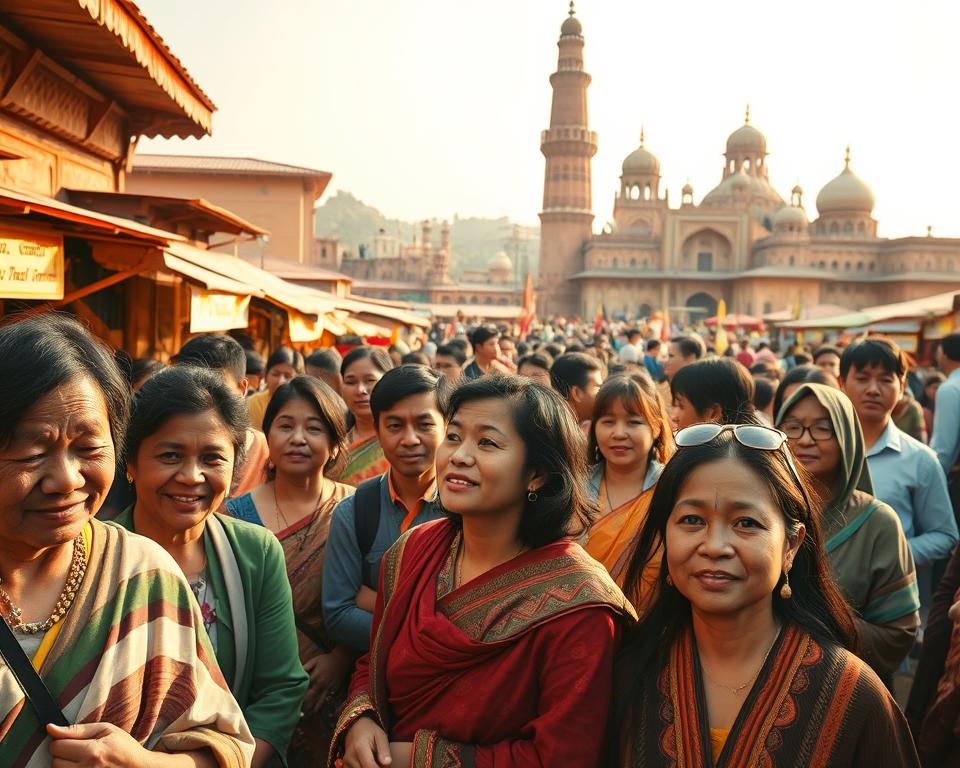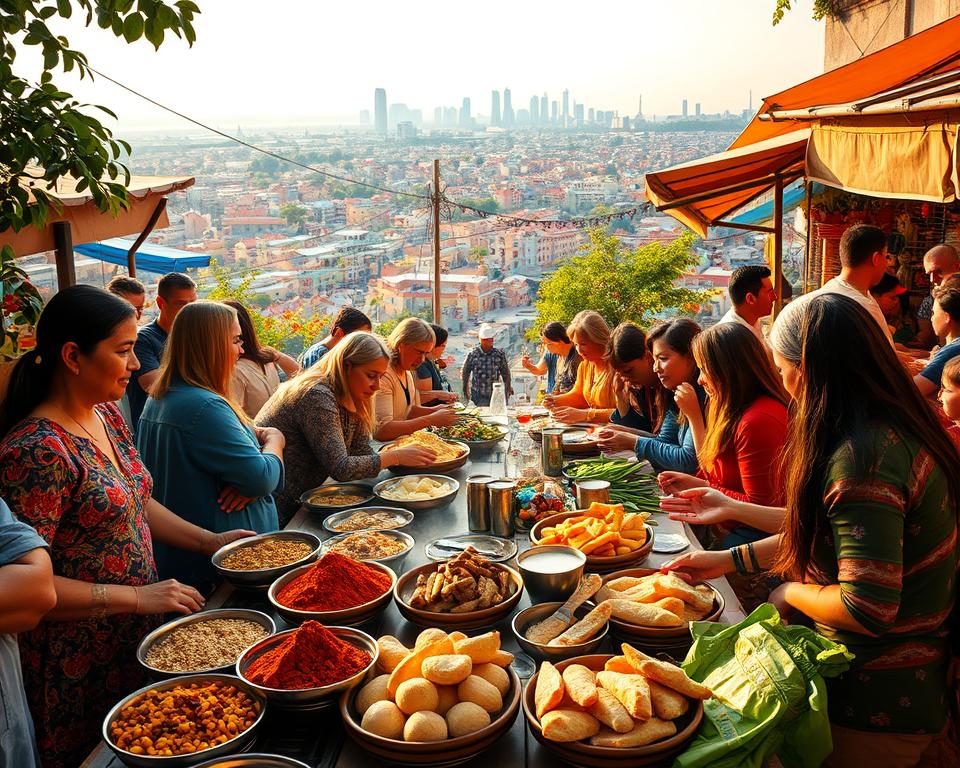Anúncios
Experiences matter more than checklists because small, human moments often add more long-term value to your life than ticking off big sights.
Have you ever wondered how to get closer to a culture without overstuffing your days? This question frames a practical, educational guide where you learn clear tips and ways to plan smarter, not perfect.
Research shows attention is fragmented: workers face interruptions about every 3 minutes and need roughly 23 minutes to regain focus. So we explain how 90-minute focus blocks help you get more from each moment on the road.
We set context on cultural immersion, modern booking tech, and privacy choices — cookie categories like necessary, performance, analytics, and advertising — so you can make informed decisions.
This Q&A keeps things balanced and family-aware. No promises, just actionable facts and suggestions to protect your focus, respect hosts, and let your world and stories grow trip by trip.
Anúncios
Experiences tips that set the stage for meaningful travel today
Instead of ticking boxes, ask what moments will stick with you long after the trip. Small encounters shape the way you remember a place. They make a story that lasts.
Why moments matter more than things: shifting from checklists to connection
Start by naming what you’re trying to feel, not which things to collect. When you plan for space, chance conversations happen. A chat over chai or a festival smile can become a core memory.
How cultural immersion reframes your itinerary and expectations
Cultural immersion asks you to watch rhythms: greetings, meals, and market flow. Landmarks stay, but they become backdrops for learning about culture and local people. Slow down and you’ll notice small signals that deepen each experience.
Anúncios
- Make room for unplanned time each day.
- Buy from the same vendor twice to open doors.
- Listen more; ask fewer rapid-fire questions.
Design your trip around culture, not just sights
Build each day around simple local routines to learn how life flows. When you center your plan on daily patterns, you open room for real connection. Markets, meals, and neighborhood walks become the frame for discovery.
Anchor days with local routines: markets, meals, and neighborhood walks
Start mornings at a public market to watch daily work and start short conversations with vendors. Eat where locals queue; a quick lunch can shape the rest of your day.
Pick one neighborhood and walk it at dawn, midday, and dusk. Patterns you see will give context that a single pass cannot.
Balance city context with rural depth for a fuller story of place
Use the city for museums, libraries, and language help to get fast context about history and social norms.
Add a rural day or overnight to feel different rhythms and family life. Mix two anchors each day—a market visit and a neighborhood walk—then leave space for a conversation or an invitation to grow your cultural literacy over years.
- Plan morning market visits as a daily anchor.
- Return to a few places across years to notice patterns.
- Book one city activity (a social history walk) to ground rural observations.
- Balance activity with short pauses—sit on a bench and watch school or plaza life.
- Keep each day light so parts can stretch if an unexpected invite appears.
Eat, learn, and live local: practical immersion moves
A simple meal can open a doorway to local knowledge and everyday life. Use food as a starting point to learn about daily rhythms, family stories, and neighborhood habits.
Food as a gateway: street stalls, home-style eateries, and cooking classes
Choose one street stall and one home-style spot you revisit. Then add a vetted cooking class as a hands-on example—makloubeh in Jordan or a dumpling workshop can connect recipes to history.
Language bridges: micro-lessons, tandem exchanges, and daily phrase goals
Set a daily phrase goal and spend 10 minutes on a micro-lesson. Try a language tandem with a student or retiree; two coffees and a shared notebook offer steady progress and mutual value.
Stay with locals: homestays, B&Bs, and small guesthouses
Book a homestay or small guesthouse where hosts join breakfast or dinner. Ask about house rules and neighborhood etiquette before you arrive to set a respectful tone with people.
Volunteer responsibly: choose ethical placements that match community needs
Pick roles through reputable organizations and prioritize skills the community requests. Avoid short-term placements that displace local jobs. Small gifts are fine—focus on listening and showing up on time.
- One activity per destination: take a market tour or cooking class and record recipes with the stories behind them.
- Track daily learning: note phrases, food, and small ways people live; these shape long-term value for your travel.
Use time wisely: focus, flow, and presence while you travel
Carve small, focused windows into your trip to make each moment count. A single, clear plan for your attention helps you notice details and feel grounded without rigid rules.
Plan 90-minute “deep dive” blocks for learning, journaling, or art
Block one 90-minute session most days for learning, journaling, sketching, or art. Deep focus lasts about 90 minutes, and one steady block lets an experience settle into memory.
If you’re trying to learn a few phrases, one focused session beats scattered practice. Top performers often fit two or three of these sessions into a day, with mornings best for the hardest work.
Protect “capital time”: silence notifications and put your phone away
Turn on airplane mode, set a timer, and put your phone out of reach. The environment improves when notifications are off and the device is not in your hand.
- Plan early: do your demanding session in the morning when focus is clearest.
- Respect cycles: two sessions can work while traveling, but even one changes how you remember places.
- Track a note: write one fact and one feeling after each block to see patterns per year.
Cap work to a single 90-minute slot if you must, take real breaks between blocks, and tie sessions to calm spots like a park or museum table. This simple structure gives you more presence and a richer travel experience.
Stop chasing trends: craft your own way to experience a destination
Before you book the most liked activity, map what matters to your curiosity and skills. Start with your purpose and choose a way that fits your learning goals, not the loudest list of trending things.
List one activity that echoes a hobby you practice at home. The closer the match, the richer the experience overseas. Combine one popular stop with two low-key places to contrast what moves you in the wider world.
Co-create with local operators
Ask small operators if they can tweak timing, stops, or language support. Small changes add big value. Choose small-group tours to increase conversation and flexibility; fewer travelers let guides tailor pace and access.
- Tell the guide what you’re trying to learn at the start; a clear brief helps them focus on your core interests.
- Keep group sizes in mind—numbers affect access, questions, and how much you can take part in an activity.
- If a plan leans heavy on things you “should” do, prune it; space lets curiosity lead.
After each day, track what worked and what didn’t. Over time you’ll refine a dependable way to travel that fits you, not the feed. That approach yields deeper experience and better memories for you and the local hosts you meet.
Smart booking and privacy: tech that supports better experiences
Understanding site permissions and live availability helps you book with confidence and save time. When you know how operator systems work, you can plan a day that actually fits.

How tour and activity systems share live availability
Operator booking platforms update slots in real time. That means a spot can vanish or open while you plan.
- Fact: check live availability before you lock your schedule to avoid clashes.
- Note meeting points, group size, and refund rules—these often change the true value more than price.
- Save confirmations offline and jot down help contacts so you can find details if an event shifts.
Respecting cookies and consent: clear choices for privacy
Sites group cookies into categories like necessary, performance, analytics, and advertising. You can accept or adjust these choices.
- Necessary cookies keep the site working; others are optional.
- Analytics cookies help sites learn context about user paths; advertising cookies personalize offers.
- Set your preferences to match comfort and protect private data shared with third parties or other people.
When to book direct, when to use marketplaces
Marketplaces give breadth fast; operator sites give route specifics and staff profiles. Use both, depending on what you need.
- Book direct for deeper context, local extras, or to ask about pace and access for your group.
- Use a marketplace when you want to compare many options quickly—this is a good example of speed over detail.
- Always factor transfer time between bookings and ask about change policies before you commit.
Quick rule: match the channel to your goal—speed, detail, or a relationship with the local team—and you’ll protect your schedule and your privacy as a traveler.
Follow the rhythm of place: festivals, music, and community events
A single calendar anchor can give your trip shape without swallowing every day. Circle one major event early, then leave room for small, unplanned moments that make travel feel alive.
Build routes around cultural calendars without overstuffing days
Pick one anchor like the Edinburgh Fringe, Holi, Songkran, Loy Krathong, or Semana Santa. Plan just two time-bound stops on that day to protect space for chance conversations with local people.
Choose one city vantage point for parades or music and one quieter neighborhood for food and relaxed conversation. Bring cash, water, sun cover, and a paper map so small things don’t derail your day.
- Check the calendar: circle an event early and keep surrounding days light.
- Limit time-bound stops: two per festival day preserves room for serendipity.
- Use local transport, pivot to a side street if crowds are dense, and learn basic etiquette before you go.
- Eat early or late to avoid lines, and write a few lines each night to capture the feeling of the day.
Accept that you’ll miss some things. Often the best memories come from the people you meet between performances and the small moments that follow.
Stories, not just snapshots: capture context and people, not only places
Tell the story behind a photo before you press the shutter; that intent will change what you notice. When you plan a clear focus, your images carry context and meaning instead of just being pretty things.
Pair each image with three short lines: who, where, why. This quick caption makes the memory readable later and helps you shape stronger stories.
Record a 30-second ambient clip now and then. Sound is art that delivers a stronger sense of place than a still image alone.
When you feel fully immersed, put the camera down and write. Your attention is your best lens; fewer photos often make a richer travel experience.
- Ask before you photograph: a nod or simple phrase shows respect and often opens more honest moments.
- Capture hands at work, food being prepared, and small tools—details tell the story at a clear level.
- Include a short quote when you can; one line of speech can carry the emotional center of a scene.
- Add a quick sketch or map each day to lock in routes and feelings you might forget.
- If someone declines, thank them and move on—the relationship matters more than the shot.
End each day by reviewing notes and clips. Over time you’ll see patterns in your moments and build lasting stories from real human connection.
Be a good guest: ethics, impact, and everyday respect
Simple habits—like learning a greeting or asking before a photo—shape how people remember you. You don’t need grand gestures. Small, steady choices protect local life and the places you visit.
Practical moves make respect easy. Learn a hello and thank-you in the local language. Ask hosts about pricing norms and avoid hard bargaining; fair pay supports a family income and local stability.
- Ask before taking photos, especially of children—consent keeps trust central.
- Dress and act to match local culture; watch hosts and adapt your choices.
- Reduce waste and lower noise so your footprint helps the environment and neighbors.
- Choose activities that follow community rules; if you’re trying to decide, ask your host for guidance.
- Share space on transport and in lines; small kindnesses echo across the city and the wider world.
Each night, note one thing you learned about people and one behavior you can improve tomorrow. That habit turns short visits into lasting, respectful ways of travel.
Conclusion
Choose one small habit to end each day so your travel becomes a clear part of your life story. ,
Keep one focused session daily for reflection; that focus helps memory and turns short moments into long value across the coming years.
Mix a popular tour with quiet hours, adjust cookies and booking settings, and check official tourism boards or embassies before you commit. These small moves protect privacy and clarity.
Capture one food note, one people moment, and one local context each day. Over time, these tiny records reshape how the world feels and how your travel fits into your life.
Plan responsibly, verify facts, and leave room for surprise—no single way fits everyone, and what works this year may change next year.



